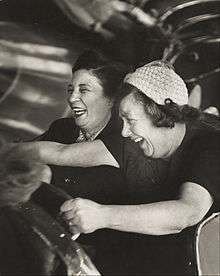David Moore (photographer)
David Moore (6 April 1927, Sydney – 23 January 2003, Longueville, New South Wales[1]) was an Australian photojournalist.
Life and career

Moore was educated at Geelong Grammar School. He began his career in the studio of Russell Roberts in Sydney, moving on to work with Max Dupain soon after. Despite being offered a junior partnership with Dupain, Moore moved to London in 1951, where commissioned work appeared in The New York Times, Time, The Observer and other publications. A series documenting life in the poor working class and unemployed suburb of Redfern was included in Edward Steichen's major 1955 exhibition The Family of Man which originated at the Museum of Modern Art and toured the world. He returned to Australia in 1958, contributing picture stories to magazines including Walkabout but continued to publish in American and British magazines, joining the New York-based Black Star photo agency. In the 1970s Moore developed non-commissioned works aimed at capturing what he called "the soft flow of time", as opposed to the "decisive moment" favoured by magazine editors.
Moore's 1966 photograph Migrants Arriving in Sydney, originating from a commission by National Geographic, is one of the most famous works of modern Australian photography.[2]
Moore published more than a dozen books. During the 1970s he was an influential figure in the development of art photography, and was a dedicated advocate for the acceptance of photography as a legitimate art form. During this period he was instrumental in the founding of the Australian Centre for Photography in Sydney.[3][4][5]
He contributed energetically to research into historical Australian photography for instance making in 1976 an archive of gelatin silver prints from the collection of Henri Mallard's glass negatives that were published in association with Sun Books in 1978.[6] The first retrospective of his work, held at the Centre, was acquired by the Australian National Gallery (now renamed the National Gallery of Australia)[7] He died days before a major retrospective on his life and work opened at the same gallery.
References
- "Master photographer Moore dead at 75" by Sharon Verghis, The Sydney Morning Herald (25 January 2003)
- "Unguarded moments" by Christopher Allen, The Australian (17 July 2010); colour image at the National Gallery of Australia. Moore made a black-and-white negative from the transparency for an exhibition in 1970; see "Public Works: Migrants Arriving ..." by Bronwyn Watson, The Australian (24 October 2009); black-and-white image
- Australia, National Gallery of. "The Spread of Time: The photography of David Moore". National Gallery of Australia. Retrieved 19 June 2018.
- "David Moore, National Portrait Gallery". National Portrait Gallery (Australia). Retrieved 19 June 2018.
- "Revealing the humanity within". The Sydney Morning Herald. Retrieved 19 June 2018.
- Building the Sydney Harbour Bridge, Henri Mallard (photographer); introduced by Max Dupain and Howard Tanner. . Melbourne, Sun Books in association with Australian Centre for Photography, 1976. ISBN 0-7251-0232-2
- "The Spread of Time" – The photography of David Moore at the National Gallery of Australia
Sources
- Byron, Sandra. "Sydney at Mid-century: Forty photographs by David Moore". Sydney, Art Gallery of New South Wales, 1987
- Moore, David. "A photographic journey: David Moore in the Pilbara", presented by Hamersley Iron, Lawrence Wilson Art Gallery, University of Western Australia, 6 November 1998. Perth, W. A., The Gallery
- Moore, David. "David Moore: Photographs". Sydney NSW: State Library of New South Wales, 2005
- Newton, Gael, "The Spread of Time" – The photography of David Moore, catalogue, National Gallery of Australia, 25 January – 21 April 2003